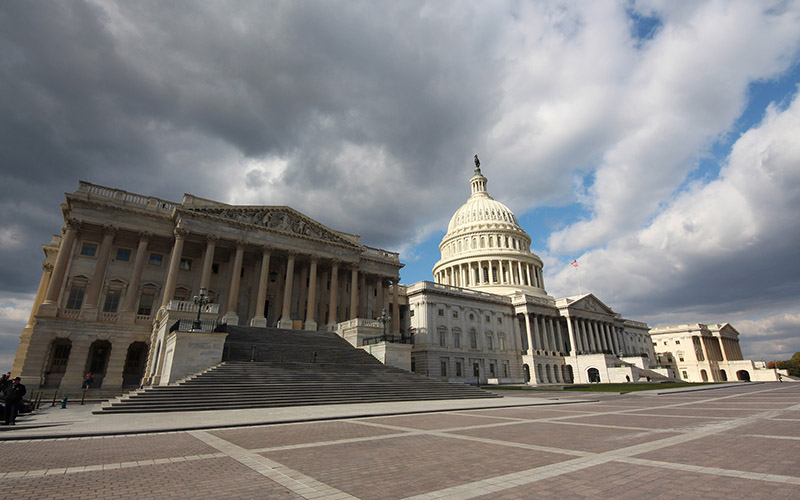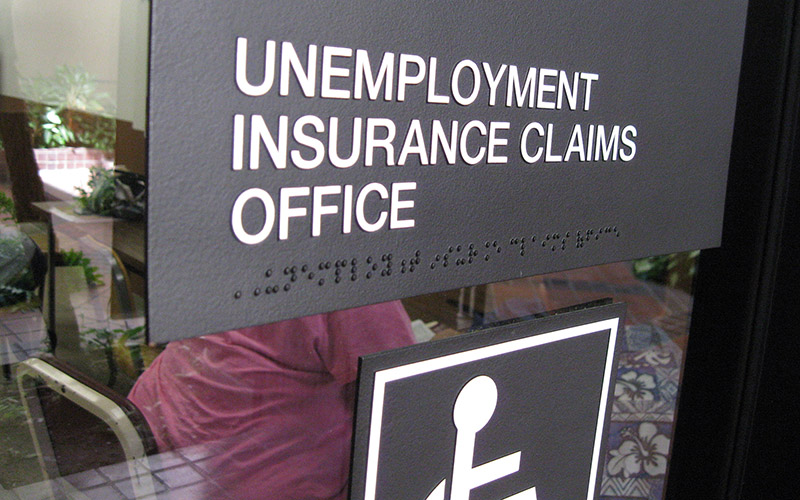
The Senate passed a $2 trillion economic stimulus package that aims to blunt the effects of the coronavirus on the economy by giving $1,200 directly to every taxpayer and pouting hundreds of billions to help businesses stay afloat. (Photo courtesy Architect of the Capitol)
WASHINGTON – The Senate gave unanimous approval late Wednesday to a historic $2 trillion economic stimulus package that calls for direct payments to taxpayers and hundreds of billions in relief for small businesses and targeted industries, like airlines.
The 96-0 vote capped days of bitter debate and contentious negotiating that included two party-line votes that had stalled the bill Sunday and again Monday.
By early Wednesday, Senate and White House negotiators had agreed on a package that increases unemployment benefits from three months to four, adds $55 billion for health care and $150 billion for local, state and tribal coronavirus relief.
That deal was almost upended at the last minute by Republican senators who said the unemployment benefits – an additional $600 per week for up to four months – would let workers stay home during the pandemic and collect $24 an hour for not working.
“There are people getting paid more not to work than they were in the workforce,” said Sen. Lindsey Graham, R-S.C., on the floor of the Senate. “It’s going to be hard to not incentivize people to leave their job.”
But an amendment to limit the unemployment benefits failed 48-48 late Wednesday before the Senate approved the final version 96-0 shortly before midnight. Sen. Martha McSally, R-Arizona, voted for the amendment and Sen. Kyrsten Sinema, D-Arizona, voted against it before both voted for the final measure.
The vote ended days of wrangling that started last week and stretched over the weekend. Democrats had complained that Republicans’ original proposal threw too much money at large corporations with too few restrictions, while Republicans accused Democrats of using the emergency legislation to push a liberal wish list unrelated to COVID-19.
The revised package also includes $10 billion for the Small Business Administration to provide immediate grants of up to $10,000 to help businesses pay operating costs, another $17 billion to cover small business loan payments for up to six months, $30 billion in emergency education funds and more than $10 billion for Indian Health Services.
The bill now goes to the Democrat-controlled House, which earlier this week presented a 1,400-page counter-proposal of its own that would boost funding to hospitals, include $60 billion for schools and billions in grants for election security.
House Speaker Nancy Pelosi said in a statement before Wednesday’s vote that while the final Senate bill had moved “from corporations-focused to workers-first,” it did not go as far as Democrats proposed in their Take Responsibility for Workers and Families Act.
“This bipartisan legislation takes us a long way down the road in meeting the needs of the American people,” said Pelosi. “House Democrats will now review the final provisions and legislative text of the agreement to determine a course of action.”
Margaret Poydock, a policy associate at the Economic Policy Institute, said some of the key differences between the House bill and the original Senate bill included worker protections and qualifications for the direct cash payments for taxpayers.
The Senate bill calls for a one-time payment of $1,200 for people who filed taxes in 2018, while the House plan proposes a $1,500 payment to individuals including retirees and the unemployed. The Senate bill would not give the direct cash payments to couples who make a combined $150,000. One expert says the cap could pose a problem for some families.
“Somebody who is living in New York City is definitely not upper-middle class at $150,000, given the incredible cost of living there, as compared to a lot of other places in this country,” said Joseph Antos, a health policy expert at the American Enterprise Institute. “This is not your standard model of providing welfare payments to people.”
Antos said the feuding between the parties is “classic political game playing as opposed to really addressing the problem,” adding that Congress will worry about the deficit “another day, when the world comes back to normal.”
The coronavirus stimulus package also includes billions of dollars in funding toward businesses, with more money toward large corporations such as airlines and ships and less for small businesses, which drew criticism from Democrats.
Antos said regardless of the amount of money going to certain corporations, “the idea behind the stimulus bill in general terms is to maintain people on payroll rather than have them apply for some kind of welfare payment,” which could take an “unbelievable amount of time.”
McSally on Tuesday defended the original version of the bill, saying it would have provided $75 billion to hospitals, more than $1 billion to Indian Health Service, $20 billion to veterans health care and $1.7 billion for the Strategic National Stockpile for equipment such as coronavirus testing kits and ventilators. She accused Democrats of using the bill to “throw money at their liberal pet projects that have nothing to do with treating the health and economic fallout of the coronavirus.”
By Wednesday, however, she voted for the revised bill.
Before Wednesday’s vote, Sinema tweeted she was “disappointed in those who played partisanship the last few days” on the “largest relief bill in U.S. history.” But she said she would vote for the final version.
Despite the Senate victory, Antos believes the measure has little chance of passing in the House because it did not go through committees or conferences.
Antos said the latest bill – the third emergency bill in a month – is just the latest of many that will be needed to help protecting the country from the health and economic costs of COVID-19. He said Congress needs “to be thinking about the next bill after this one…specific thinking quickly about how to put quick infusions of cash into the health industry.”


